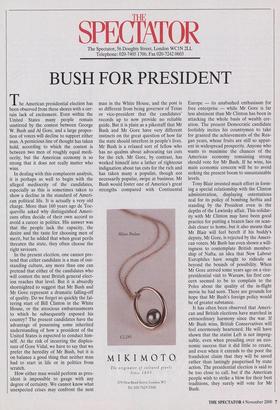S P ECTATO R The Spectator, 56 Doughty Street, London WC1N 2LL Telephone:
020-7405 1706; Fax 020-7242 0603
BUSH FOR PRESIDENT
The American presidential election has been observed from these shores with a cer- tain lack of excitement. Even within the United States many people remain unstirred by the contest between George W. Bush and Al Gore, and a large propor- tion of voters will decline to support either man. A pernicious line of thought has taken hold, according to which the contest is between two men of roughly equal medi- ocrity, but the American economy is so strong that it does not really matter who wins.
In dealing with this complacent analysis, it is perhaps as well to begin with the alleged mediocrity of the candidates, especially as this is sometimes taken to show a decline in the standard of Ameri- can political life. It is actually a very old charge. More than 160 years ago de Toc- queville asked why distinguished Ameri- cans often decide of their own accord to avoid a career in politics. His answer was that the people lack the capacity, the desire and the taste for choosing men of merit, but he added that when great perils threaten the state, they often choose the right saviours.
In the present election, one cannot pre- tend that either candidate is a man of out- standing culture, any more than one can pretend that either of the candidates who will contest the next British general elect- ion reaches that level. But it is absurdly shortsighted to suggest that Mr Bush and Mr Gore represent a dramatic falling-off of quality. Do we forget so quickly the fal- tering start of Bill Clinton in the White House, or the atrocious embarrassments to which he subsequently exposed his country? The present candidates have the advantage of possessing some inherited understanding of how a president of the United States is expected to conduct him- self. At the risk of incurring the displea- sure of Gore Vidal, we have to say that we prefer the heredity of Mr Bush, but it is on balance a good thing that neither man had to start in life or in politics from scratch.
How either man would perform as pres- ident is impossible to gauge with any degree of certainty. We cannot know what unexpected crises may confront the next man in the White House, and the post is so different from being governor of Texas or vice-president that the candidates' records up to now provide no reliable guide. But it is plain as a pikestaff that Mr Bush and Mr Gore have very different instincts on the great question of how far the state should interfere in people's lives. Mr Bush is a relaxed sort of fellow who has no qualms about advocating tax cuts for the rich. Mr Gore, by contrast, has worked himself into a lather of righteous indignation about tax cuts for the rich and has taken many a populist, though not necessarily popular, swipe at business. Mr Bush would foster one of America's great strengths compared with Continental Europe — its unabashed enthusiasm for free enterprise — while Mr Gore is far less abstinent than Mr Clinton has been in attacking the whole basis of wealth cre- ation. The present Democratic candidate foolishly incites his countrymen to take for granted the achievements of the Rea- gan years, whose fruits are still so appar- ent in widespread prosperity. Anyone who wants to maximise the chances of the American economy remaining strong should vote for Mr Bush. If he wins, his main economic concern will be to avoid stoking the present boom to unsustainable levels.
Tony Blair invested much effort in form- ing a special relationship with the Clinton administration, displaying ostentatious zeal for its policy of bombing Serbia and standing by the President even in the depths of the Lewinsky affair. This solidar- ity with Mr Clinton may have been good practice for putting a brazen face on scan- dals closer to home, but it also means that Mr Blair will feel bereft if his buddy's deputy, Mr Gore, is rejected by the Ameri- can voters. Mr Bush has even shown a will- ingness to contemplate British member- ship of Nafta, an idea that New Labour Europhiles have sought to ridicule as beyond the bounds of possibility. When Mr Gore arrived some years ago on a vice- presidential visit to Warsaw, his first con- cern seemed to be to complain to the Poles about the quality of the in-flight movie he had seen. There are grounds for hope that Mr Bush's foreign policy would be of greater substance.
It has often been observed that Ameri- can and British elections have marched in extraordinary harmony since the war. If Mr Bush wins, British Conservatives will feel enormously heartened. He will have shown that the statist Left is not impreg- nable, even when presiding over an eco- nomic success that it did little to create, and even when it extends to the poor the fraudulent claim that they will be saved rather than lastingly pauperised by state action. The presidential election is said to be too close to call, but if the American people wish to strike a blow for their best traditions, they surely will vote for Mr Bush.


























































































 Previous page
Previous page